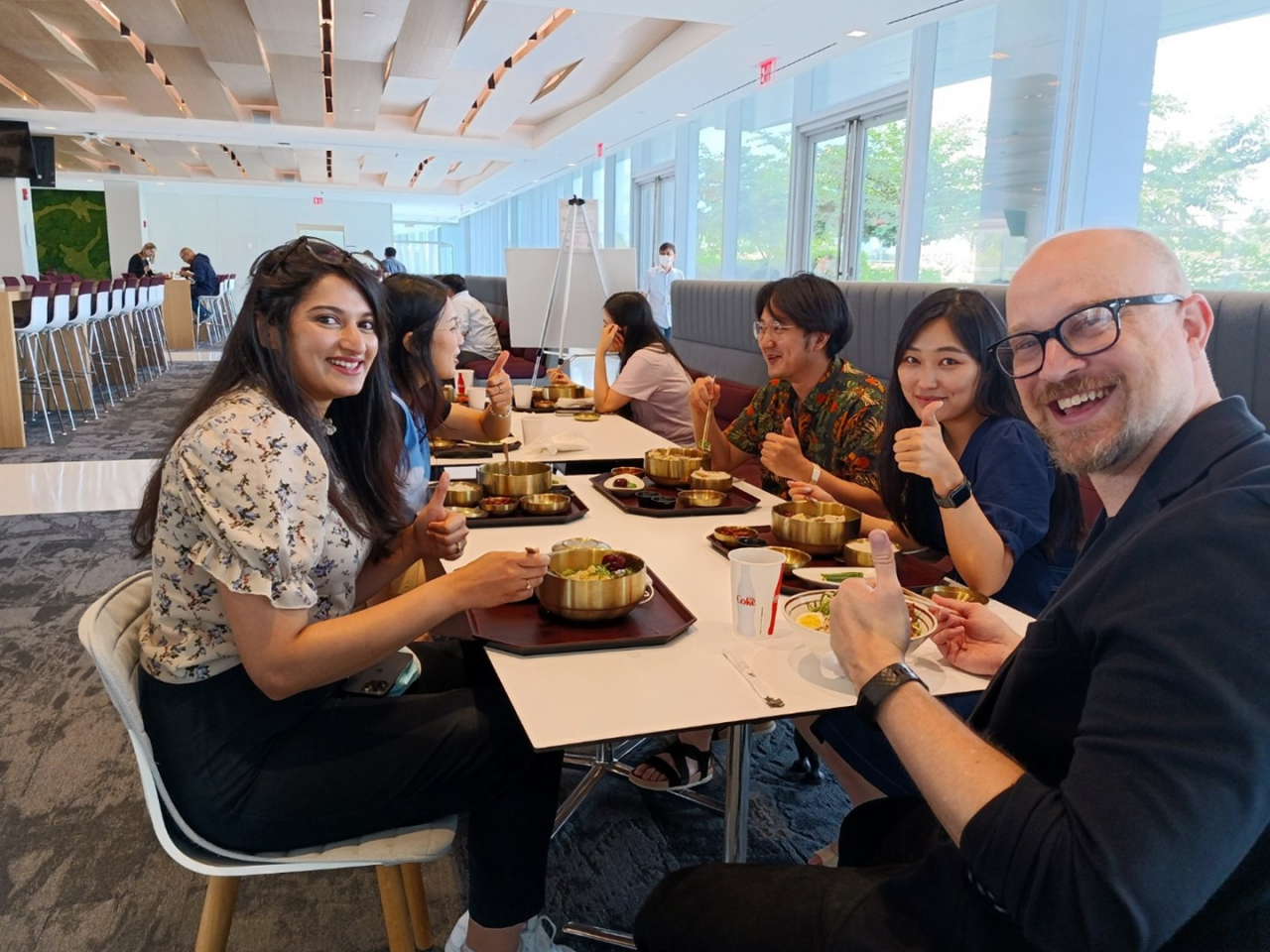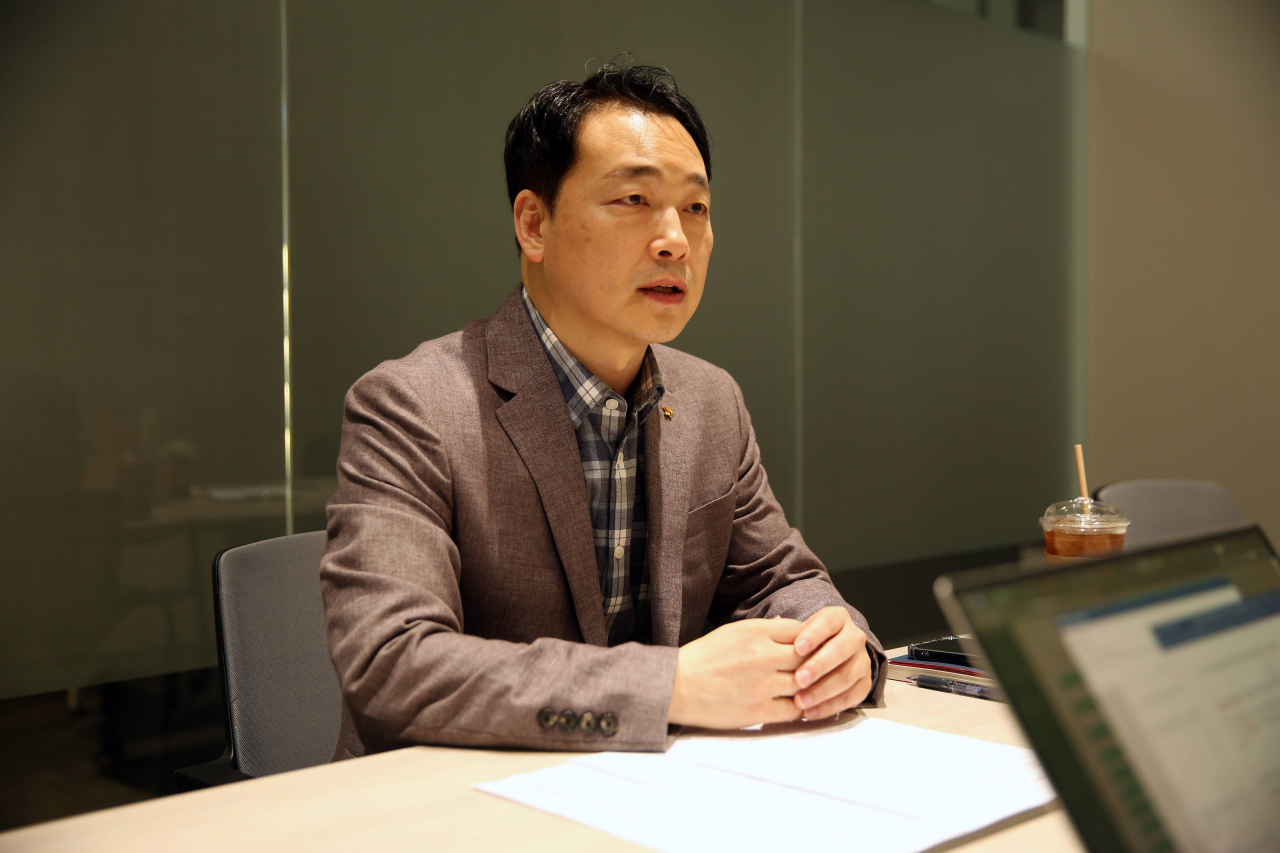 |
Workers at LG Electronics’ North American headquarters in New Jersey dine at a cafeteria whose menus are provided by Ourhome. (Ourhome) |
Riding on a wave of momentum for the soaring popularity of South Korean food among global consumers, "K-food" institutional food service businesses are gaining traction at overseas cafeterias.
Ourhome, a Korean food catering giant, says it has been steadily increasing the proportion of its global sales since starting its first overseas business on 2010 -- with its on-site food catering service performances in cafeterias abroad largely buoyed by its decision to organize nearly half of its meals on the basis of Korean cuisine.
Currently, Ourhome's overseas sales, which were tallied at 202 billion won ($151 million) last year, make up more than 10 percent of the company's total sales. The company has also seen the proportion of its global sales compared to its total sales nearly double during the last five years.
As of 2022, Ourhome said 35 percent of Ourhome's global sales came from the US market, with the company operating food catering services in cafeterias for the United States Postal Service in Los Angeles and at LG Electronics’ North American headquarters in New Jersey.
"Our strength in overseas markets lies in the provision of K-food menus," said Nat Ryu, the head of Ourhome's US business, during an interview with The Korea Herald.
Ryu said that Korean menus, on top of being greatly sought after by global consumers due to the rising popularity of K-pop and K-content, are optimal candidates for constituting a meal plan -- as they could be conveniently used to ensure nutritional balance compared to cuisines from other countries.
These characteristics centering on the health benefits of Korean dishes have contributed to Ourhome winning contracts to operate overseas cafeterias, amid the trend in the US in particular to eat healthy, said Ryu.
Ryu added that the company's success in the US market also came as it focused on providing services additional to on-site meal catering -- such as setting up exclusive selling stands in cafeterias to allow customers to purchase home replacement meals and packaged versions of Korean side dishes, such as kimchi, gim (dried seaweed) and tteok (rice cakes).
"While Korean consumers consider meals provided by the company (or school) as a part of the organization's welfare program, in the United States, most of the consumers have to pay for their own meals, as the companies mostly don't support their staff with subsidies for meals," said Ryu.
"Therefore, it is essential that institutional food services given at cafeterias are of the highest quality, while providing consumers with an ample amount of choices by organizing various menus -- as consumers have to pay for their food completely on their own," he added.

According to Ryu, years of Ourhome's experiences in conducting in-flight catering services helped the company acquire the know-how to operate food catering services within global organizations. Ourhome acquired Hacor, a Los Angeles-based food company, in 2018 to start in-flight catering services from Los Angeles International Airport.
"Producing in-flight meals requires thorough revision of products' hygiene levels and operating stations. The stations have to follow strict security standards," he said, adding that Ourhome's strict adherence to hygiene regulations helped Ourhome win multiple contracts in institutions across the US.
Ryu said that the company's US food catering service is expected to grow by a wide margin this year, as Ourhome is scheduled to run operations in LG Energy Solution's headquarters in Michigan, which, Ryu said, are estimated to contribute to increasing the company's US sales by 20 to 30 percent on-year.
Moreover, in order to facilitate the logistics process to distribute locally produced goods, Ryu said Ourhome is currently in midst of partnering with local partners in Europe and the US to promote projects in manufacturing and local distribution.
"K-food is healthy, nutritious and the type of food that combines taste and zest," said Ryu, adding that Ourhome aims to enhance Korean food's status in the mid- to long-term by enabling customers to experience the benefits of eating it on a daily basis.
 |
Nat Ryu, the head of Ourhome's US business, speaks during an interview held at Ourhome's headquarters in Magok-dong, Seoul. (Ourhome) |
This article is the eighth installment in a series of interviews with global business chiefs of South Korean food companies that are expanding aggressively in overseas markets. -- Ed.





![[Herald Interview] How Gopizza got big in India](http://res.heraldm.com/phpwas/restmb_idxmake.php?idx=644&simg=/content/image/2024/11/20/20241120050057_0.jpg)

